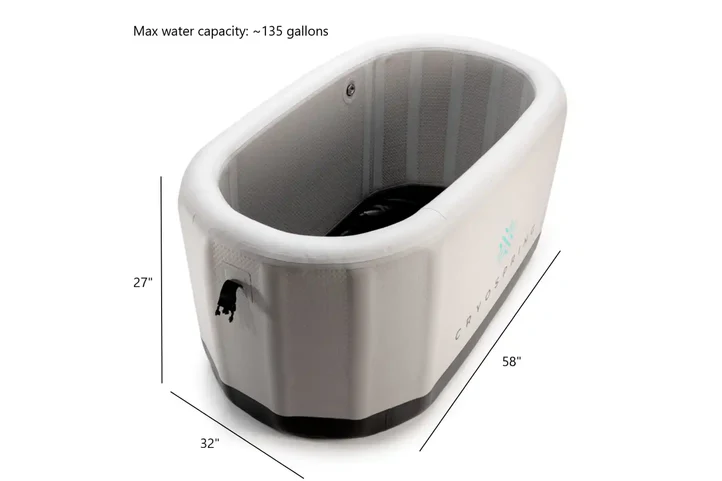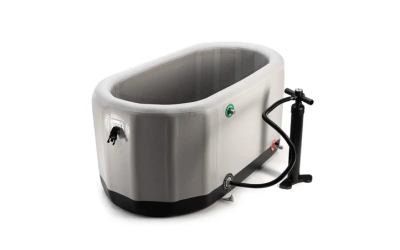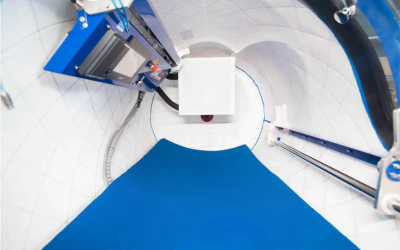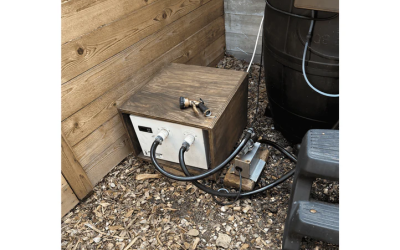Definition of the cold plunge
A cold plunge, or hydrotherapy or cryotherapy, is a therapeutic practice that involves immersing one’s body in cold water or ice to promote various health benefits. The origins of this practice trace back to ancient civilizations, where cold water immersion was used to improve overall well-being and treat different ailments.
The primary purpose of a cold plunge is to aid in post-workout recovery. After an intense workout, your muscles can become inflamed and sore due to lactic acid buildup. Taking a plunge into cold water in a cold plunge chiller can help reduce inflammation and soothe muscle soreness. Additionally, the freezing temperature causes your blood vessels to constrict, helping to flush out lactic acid and improve circulation.
The benefits of a cold plunge extend beyond muscle recovery. It can also help boost your immune system, increase mental alertness, and enhance overall mood. The cold water stimulates the release of endorphins, known as the body’s natural painkillers and mood elevators.
To incorporate a cold plunge into your post-workout routine, simply fill a bathtub or pool with cold water and immerse your body for a few minutes. It’s important to start with shorter durations and gradually increase the time as you become accustomed to the cold temperature. Always listen to your body and discontinue the practice if you experience discomfort or health concerns.
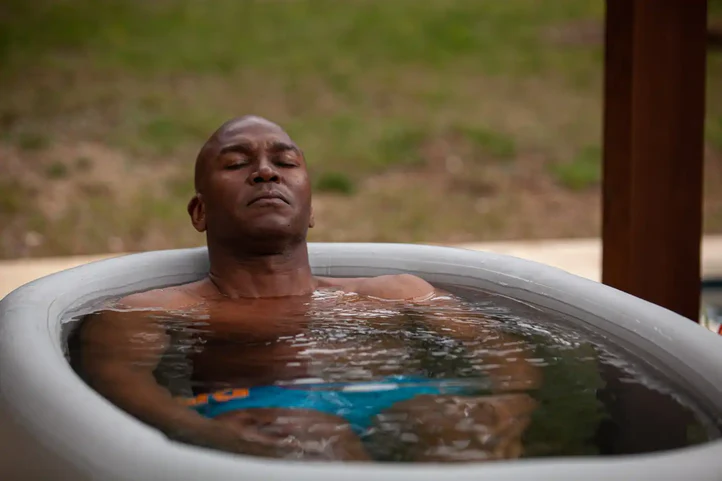
Brief explanation of the benefits of cold plunges
Are you looking for a simple and effective way to enhance your mood, reduce inflammation, relieve muscle soreness, and improve your recovery after a tough workout? Look no further than the cold plunge! This rejuvenating practice offers many benefits that can transform your wellness routine.
First and foremost, cold plunges are known for their mood-enhancing properties. Immersing yourself in chilly water can instantly uplift your spirits and leave you feeling refreshed and rejuvenated. It’s like a natural pick-me-up that can turn your frown upside down.
Additionally, cold plunges have been shown to reduce inflammation in the body effectively. This is particularly beneficial for individuals who struggle with chronic inflammation, which can negatively impact overall health. Exposure to cold water stimulates the release of anti-inflammatory molecules, which can help combat inflammation and keep you feeling your best.
Furthermore, cold plunges are highly effective at relieving muscle soreness. A dip in cold water can provide immediate relief if you’ve pushed yourself in a workout or engaged in physically demanding activities. The freezing temperature constricts blood vessels and reduces swelling, minimizing muscle soreness and promoting faster recovery hence it is recommended to do a cold plunge after workout.
But the benefits don’t stop there! Cold plunges can also significantly boost your immune system. The frigid water stimulates your body’s production of white blood cells, vital for fighting infections and keeping you healthy. Regularly engaging in this practice can strengthen your immune system and prevent pesky illnesses.
Lastly, cold plunges can improve resilience and stress management. You challenge your body and build mental and physical resilience by subjecting yourself to temporary discomfort in cold water. Over time, this can translate into better stress management and an increased ability to handle life’s curveballs.
Health benefits of cold plunges
Whether you’re a fitness enthusiast or simply looking to optimize your overall well-being, the invigorating practice of cold plunges is what you need. Cold plunging, as the name suggests, involves immersing your body in ice-cold water for a short period. Beyond the initial shock, this practice offers many health benefits that can profoundly impact your physical and mental state. From boosting immune function to alleviating muscle soreness, let’s dive in and explore the incredible advantages a cold plunge can bring to your life.
Boosted Immune Function
Immersing your body in cold water stimulates your circulatory system, promoting the production of white blood cells vital for a robust immune system. The cold water constricts your blood vessels, allowing your arteries to pump blood more efficiently, resulting in improved circulation throughout your body. This enhanced blood flow enables your immune cells to reach various organs and tissues more effectively, providing a first line of defense against pathogens. So, consider incorporating cold plunges into your routine to strengthen your immune system and ward off illnesses.
Relief from Muscle Soreness
Cold plunges can be your best friend for post-workout recovery. The icy water helps reduce inflammation and swelling in your muscles, leading to faster recovery and reduced muscle soreness after intense physical activity. By constricting the blood vessels in your muscles, cold water facilitates the flushing out of lactic acid buildup, a major contributor to muscle soreness. So, if you’ve been experiencing the aftermath of a challenging workout, a refreshing cold plunge can provide the relief your muscles crave.
Enhanced Mood and Mental Clarity
Cold plunging doesn’t just have physical benefits but mental ones as well. The shock of the cold water triggers the release of endorphins, often referred to as “feel-good” hormones. These endorphins can boost your mood, help alleviate symptoms of depression and anxiety, and promote a sense of well-being. Additionally, the refreshing sensation of a cold plunge can activate your sympathetic nervous system, which is responsible for the fight-or-flight response. This activation increases alertness and mental clarity, making cold plunges a perfect way to kickstart your day and enhance your cognitive function.
Improved Skin and Hair Health
Believe it or not, cold plunges can work wonders for your skin and hair! The cold water helps tighten your skin’s pores, reducing the appearance of blemishes and promoting a more youthful complexion. Additionally, cold water can stimulate blood circulation to your scalp, promoting hair growth and strengthening hair follicles. If you want to enhance your natural beauty, adding cold plunges to your self-care routine might be the secret to achieving healthy skin and luscious locks.
Benefits for athletes and those with chronic pain conditions
Welcome to the world of cold plunge therapy, an increasingly popular technique that can benefit both athletes and individuals with chronic pain conditions. This article will explore how a cold plunge can enhance athletic performance, aid recovery, and relieve chronic pain. Whether you’re a professional athlete or someone dealing with chronic pain, this article will shed light on the numerous benefits that a cold plunge can offer.
Enhances Athletic Performance
FoA cold plunge can be a game-changer for athletes looking to take their performance to the next level. Dipping cold water immediately after intense physical activity helps reduce muscle inflammation and promote faster recovery. By reducing inflammation, cold plunge therapy allows athletes to bounce back quicker and perform at their peak for longer periods. It also helps minimize lactic acid buildup, which can cause muscle soreness and fatigue. With the ability to improve muscle recovery and reduce fatigue, athletes can push their limits and achieve new milestones.
Aids in Recovery
When recovering from workouts or injuries, a cold plunge is just what the doctor ordered. By subjecting the body to freezing temperatures, blood vessels constrict, swelling is reduced, and fast products that may accumulate during strenuous activity. are flushed out. This process boosts the body’s natural healing ability and helps prevent potential injuries. Cold plunge therapy can also decrease post-workout muscle soreness by numbing nerve endings and reducing pain sensation. Additionally, the contrast between hot and cold water stimulates circulation, ensuring oxygen-rich blood reaches the muscles, further aiding recovery.
Provides Relief for Chronic Pain Conditions
For individuals suffering from chronic pain conditions like arthritis or fibromyalgia, cold plunge therapy can be a lifesaver. The cold water acts as a natural analgesic, numbing pain and alleviating discomfort. The constricting effect of the cofreezingemperature on blood vessels also helps reduce inflammation, which is often a primary contributor to chronic pain. Regular cold plunging can provide much-needed relief and improve the quality of life for those with chronic pain conditions.
How cold plunges can help with post-workout recovery
- Muscle soreness relief: Studies have shown that taking a cold plunge after exercise can help alleviate muscle soreness. The cold temperature constricts your blood vessels, reducing inflammation and swelling, two major contributors to post-workout soreness. Say goodbye to those achy muscles!
- Faster recovery of muscle function: Cold plunges have been found to speed up muscle function recovery. The chilly water activates your body’s natural healing processes, stimulating blood circulation and flushing out metabolic waste products. This increased blood flow delivers oxygen and nutrients to your muscles, promoting faster recovery and restoring functionality.
- Improvements in long-term training adaptations: Regular cold plunges may also enhance your long-term training adaptations. By boosting blood circulation, these icy dips can help improve your body’s ability to repair and build muscles. This means you may experience greater gains and progress in your fitness journey.
Impact on muscle healing and performance
Cold plunges have recently gained popularity due to their potential impact on muscle healing and performance. Although these icy dips may sound intimidating, they can benefit your muscles.
One key advantage of cold plunges is that they aid muscle recovery. Your muscles may feel sore and tired after an intense workout or physical activity. Cold plunges help speed recovery by reducing inflammation and swelling in the muscles. This can lead to faster healing and a reduced risk of injury.
In addition to promoting muscle healing, cold plunges can help reduce muscle soreness. The extreme cold temperatures cause the blood vessels in your muscles to constrict, which can help flush out lactic acid and other waste products that contribute to soreness. Cold plunges reduce muscle soreness and allow you to bounce back more quickly and perform at your best.
Furthermore, cold plunges have been shown to impact muscle strength positively. Exposing your muscles to cold temperatures causes them to contract and strengthen, increasing muscle tone and improving overall stability.
Who should avoid cold plunges?
While cold plunges have gained popularity in recent years for their numerous health benefits, it’s important to consider that not everyone may be suited for this invigorating practice. Cold plunges involve immersing yourself in extremely cold water for a short period, typically below 50 degrees Fahrenheit. While this may seem like a refreshing and rejuvenating experience for many, some individuals should exercise caution or avoid cold plunges altogether.
- Individuals with certain medical conditions: People with underlying medical conditions should be wary of cold plunges. Conditions such as heart problems, hypertension, respiratory issues, or any other cardiovascular diseases can be negatively affected by the shock of the cold water. These individuals should prioritize their health and consult healthcare professionals before considering cold plunges.
- Pregnant women: The well-being of both the mother and the baby should always be the top priority during pregnancy. Cold plunges can cause considerable stress on the body and disrupt the delicate balance required for a healthy pregnancy. Pregnant women should avoid cold plunges and opt for other forms of relaxation and exercise that are safer and more suitable for their condition.
- Individuals with compromised immune systems: Cold plunges can temporarily decrease the body’s core temperature and put additional stress on the immune system. For people with weakened immune systems, such as those undergoing chemotherapy or with autoimmune diseases, the sudden drop in temperature may have adverse effects. It is recommended that these individuals discuss cold plunges with their healthcare provider before attempting them.
Remember, when it comes to cold plunges, it is crucial to prioritize your overall well-being and make informed decisions about whether this practice suits your circumstances. It’s always best to consult with a healthcare professional to ensure you’re making the right choices.

